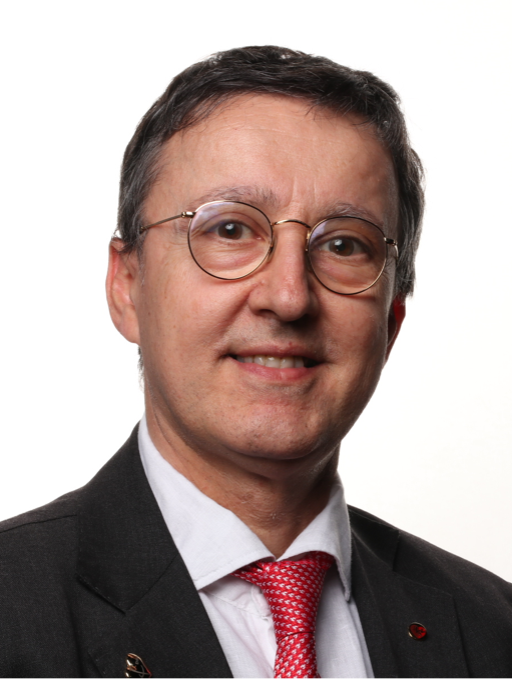Incorporating the concept of atrial fibrillation (AF) burden into clinical practice - Final Assessement
Professor Giuseppe Boriani, MD, PhD, FEHRA, FESC
Doctor of Philosophy (PhD) in Cardiovascular Physiopathology at the University of Milan, Italy.
Professor of Cardiology at the University of Modena and Reggio Emilia and Chief of Cardiology at Modena University Hospital.
Director of the Post-Graduate School of Cardiovascular Diseases at the University of Modena and Reggio Emilia.
 Graduation in Medicine and Specialization in Cardiology at the University of Bologna, Italy.
Graduation in Medicine and Specialization in Cardiology at the University of Bologna, Italy.
Doctor of Philosophy (PhD) in Cardiovascular Physiopathology at the University of Milan, Italy.
Professor of Cardiology at the University of Modena and Reggio Emilia and Chief of Cardiology at Modena University Hospital.
Director of the Post-Graduate School of Cardiovascular Diseases at the University of Modena and Reggio Emilia.
Former member of the Board of the European Heart Rhythm Association and Chair of the Health Economics Committee (2009-2013).
Fellow of the European Society of Cardiology and the European Heart Rhythm Association.
Member of the Heart Rhythm Society.
President (2016-2018) of AIAC (the Italian Society of Cardiac Pacing and Arrhythmology).
Scientific activity focused on clinical electrophysiology, pacemakers, implantable defibrillators, cardiac resynchronization therapy, atrial fibrillation, antiarrhythmic drugs, heart failure, ischemic heart disease, health economics and clinical cardiology.
Member of the Editorial board of the European Heart Journal, European Journal of Heart Failure, Heart, and the European Journal of Internal Medicine.
Executive editor of EP Europace.
Wolfram Doehner, MD, PhD, FESC, FHFA
Professor of Interdisciplinary Stroke Research at the Charité - Universitätsmedizin Berlin, Germany.
 Dr Doehner is a cardiologist and specialist in internal medicine and nutritional medicine. He works at the Berlin Institute of Health -Center for Regenerative Therapies (BCRT) and at the Dept. of Cardiology at the Virchow hospital of the Charité – Universitätsmedizin Berlin. He also holds a faculty position at the Center for Stroke Research Berlin (CSB) and a visiting professorship at the Karls University, Prague, Czech Republic.
Dr Doehner is a cardiologist and specialist in internal medicine and nutritional medicine. He works at the Berlin Institute of Health -Center for Regenerative Therapies (BCRT) and at the Dept. of Cardiology at the Virchow hospital of the Charité – Universitätsmedizin Berlin. He also holds a faculty position at the Center for Stroke Research Berlin (CSB) and a visiting professorship at the Karls University, Prague, Czech Republic.His academic work includes more than 490 publications in peer-reviewed journals and book chapters, h-index 73, total citations >24,000 (Research Gate, Sept.22). He is the associate editor of several scientific journals. He currently holds various positions within the European Society of Cardiology (ESC): founding member and chair of the ESC Council on Stroke (2018-20), co-chair of the HFA Congress 2020, secretary of the rehabilitation section of the European Association on Preventive Cardiology (EAPC, 2018-20), member of the ESC clinical program committee (2014-2020) and member of the Board of the ESC (2022 – ongoing).
Rod Passman, MD
Jules J. Reingold Professor of Electrophysiology at Northwestern University, Feinberg School of Medicine (USA).
 Dr Passman is the Jules J. Reingold Professor of Electrophysiology at Northwestern University, Feinberg School of Medicine (USA).
Dr Passman is the Jules J. Reingold Professor of Electrophysiology at Northwestern University, Feinberg School of Medicine (USA).He is a highly respected cardiac electrophysiologist who joined Feinberg in 1998 as an assistant professor of Medicine in the Division of Cardiology and was awarded the title of full professor in 2013. He also holds an appointment in the Department of Preventive Cardiology.
A true innovator in his field, Dr. Passman is an internationally-recognized leader in cardiac monitoring and stroke prevention.
He is part of the editorial board of J CV Digital Health (2021 - Present) and is the associate editor of Pacing and Clinical Electrophysiology: PACE (2018 - Present). He is a Fellow of the American Heart Association (2019 - Present), the American College of Cardiology (2019 - Present), and the Heart Rhythm Society (2019 - Present).
Faculty Disclosures:
Wolfram Doehner, MD, PhD, FESC, FHFA
- Research support: EU-FP7, HORIZON-2020, German Ministry of Education and Research, German Center of Cardiovascular Research ,Vifor Pharma, ZS Pharma
- Consulting and speaker honoraria: AiMediq, Bayer, Boehringer Ingelheim, Boston Scientific, Bristol-Myers Squibb, Ferrer, Lilly, Medtronic, Pfizer, Sanofi, Sphingotec, Vifor Pharma.
Giuseppe Boriani, MD, PhD, FEHRA, FESC
- Consulting and speaker honoraria: Bayer, Boehringer Ingeheim, Boston Scientific,Daiichi Sankyo, Janssen, Sanofi.
Rod Passman, MD
- Consulting and speaker honoraria: Janssen Pharmaceuticals, Inc.,John Wiley & Sons, Inc., Johnson & Johnson, Medtronic, Inc., Wolters Kluwer Health, Inc. (Wolters Kluwer NV), Wolters Kluwer NV
